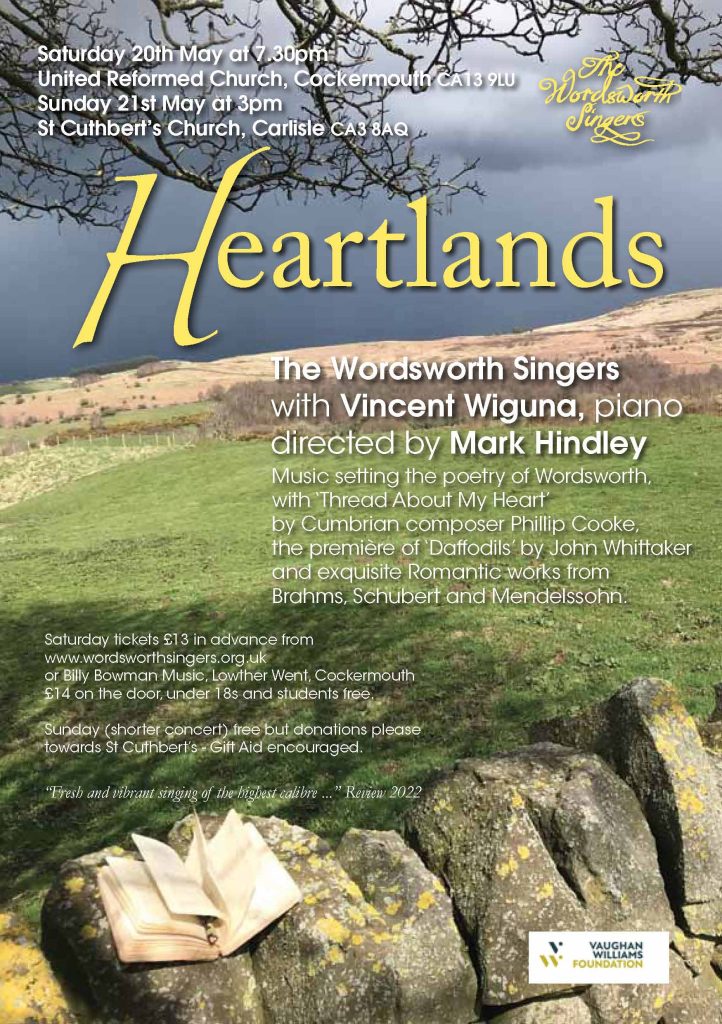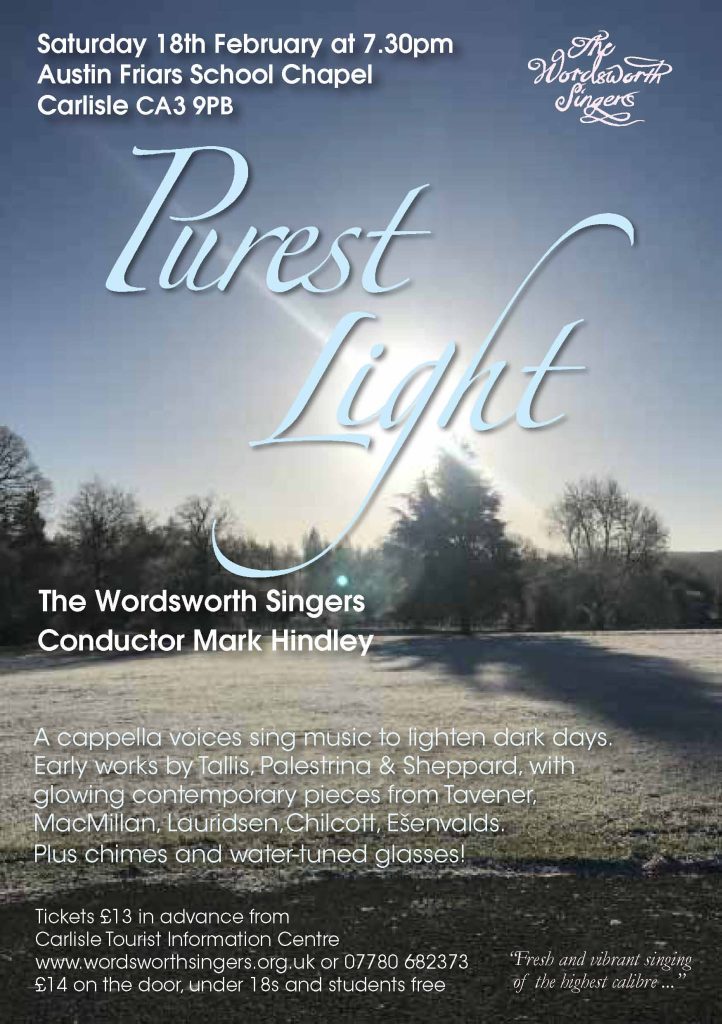
United Reformed Church, Cockermouth
It’s not often one has the opportunity to hear The Wordsworth Singers here in Cockermouth. Their concert, on Saturday 20th May was excellent in many ways and the singers were on fine form. I’ll not analyse each work (I refer to the first half) as the old masters can speak for themselves: Schubert’s Hymne an den Undenlichen had such power and grandeur, Mendelssohn’s Sechs Lieder beautiful lines and evocative word painting and finally Brahms’ Drei Quartette was granite-like in this performance. All the works were handled superbly under the direction of Mark Hindley. He moulds and shapes every word and phrase admirably all with what appears to be minimal effort; he achieves such a monumental range of dynamics from his singers at which one can only marvel, from ear-splitting forte to the barely audible whisperings of pianissimo. The same could be said of the accompanist Vincent Wiguna. He played with sympathy, poise and sensitivity throughout; such intelligent artistry in an accompanist is rare. The choir gave everything they could throughout the evening; the performances were rich and sonorous, powerful and dramatic, sensitive and touching, uplifting too. The whole ensemble made it look easy, but we all know this illusion is only achieved with hard work and dedication.
The second half of Saturday’s concert was also excellent in the fact that it promoted new music, something The Wordsworth Singers do wonderfully. We had a première, John Whittaker’s setting of Wordsworth’s I Wandered Lonely as a Cloud. It was a very imaginative and effective piece (Wordsworth is notoriously difficult to set to music) but Mr Whittaker rose to the occasion admirably. His self-confessed style is that of the English pastoral school and none the worse for it. Despite the work’s complexities, the choir shone with an excellent reading. Similarly with the Eric Whitacre All Seems Beautiful to Me: the singers excelled in the beautifully woven lines and translucent textures of this expert setting. However, for me, the crowning glory was the second performance of Phillip A Cooke’s Thread About My Heart. The first performance was given in Keswick last year with harp and string accompaniment; Saturday’s performance used the composer’s own piano score, which works well, but not as well as the intended forces as in the première. It is to me a sublime work, not only does Cooke set William Wordsworth’s poetry but also the diary entries of his sister Dorothy; an extremely difficult challenge for a composer. However, it is achieved to thrilling effect as a set of interludes throughout the work. These interludes, for solo soprano, were sung by choir member Fiona Weakley; her performance was mesmerising and her tone and diction crystal clear. I can only add that I think Mr Cooke a lucky man to have such a beautiful work championed by such fine musicians.
Dr Philip Wood

Austin Friars School Chapel, Carlisle
Though an amateur choir, The Wordsworth Singers under Mark Hindley have a strong reputation for taking on challenging music, and presenting eclectic and interesting programmes. They don’t do boring.
The highlight of Saturday’s literally ringing presentation was a new Latvian piece, “Northern Lights” by Eriks Esenvalds, in which various of the singers were deputed to accompany the choir and themselves on sounded wineglasses (you know, wetting your finger and running it around the edge). There was also a metallophone (chime bars), sportingly played by one of the sopranos who did not appear to have been allowed light duties on the line: good for her. The tingling result around the spare dissonances was magical. The piece itself is a haunting combination of an old Latvian folksong and an extract from the journals of two nineteenth century mariners. Each are responding to the Northern Lights. The folksong imagines that the Northern Lights are spirits of dead warriors continuing their fight in the sky and presaging further wars down here on earth. This element was given to a high tenor solo, dreamily delivered by Simon Martindale. The chorus respond with passages of energetic narrative drama as the mariners attempt to be scientific yet are driven to beautiful language in their effort to put in words what has struck them with wonder: “Like a pathway of light, the northern lights seemed to draw us into the sky. Yes, it was harp music, wild-storming in the darkness.”
The evening began with some sixteenth century treatments of the “light” theme: Tallis, Eccard, Palestrina, Philips and Sheppard. Though many are standards of the choral repertoire, they are not that easy. It was risky to start with Tallis’ Videte Miraculum, which requires the top trebles to sustain a very long string of high Gs. Perhaps not yet quite in their stride, this began to sound strained, and the ensemble in the plainchant suffered a little. No matter, as the choir settled and warmed in the lovely Johann Eccard account of Mary bringing her child to the temple, and found some cascading layered lines to enjoy to a mesmeric tread in Palestrina’s Senex Puerum Portabat. The first half ended with John Sheppard’s Gaude Maria. Here the choir swept authoritatively through well executed chantlines into rich walls of polyphonic sound, making the most of the washy Austin Friars acoustic.
The second half of the programme opened dramatically with (modern) John Tavener’s “The Eternal Sun”, a strident depiction of sunrise, the full vim of the choir being contrasted with a well-blended solo quintet, placed far back behind the others. The choir again gave its vibrant best in Morten Lauridsen’s “O Nata Lux”. Mark Hindley’s driving direction ensured that this and all of tonight’s music lived with unflagging energy and pace.
The evening ended with Bob Chilcott’s “Sun, Moon, Sea, and Stars” a somewhat mawkish love lyric, cleverly and enjoyably harmonised by the composer and sportingly sung as a solo by Simon Mortimer. After the Nordic wonder of the Northern Lights, this seemed a little like that extra pudding after an already very good meal. I preferred to walk away savouring the words of the nineteenth century mariners: “A fiery crown of auroral light cast a warm glow across the arctic ice. Again at times it was like softly playing, gently rocking silvery waves on which dreams travel into unknown worlds.”
Paul im Thurn
Last night’s concert, “Purest Light”, performed by The Wordsworth Singers and led by conductor Mark Hindley, showcased an impressively wide range of musical styles.
In first half, the singers performed musical settings of texts about the presentation of Jesus at the Temple of Jerusalem, beginning with Tallis’ Videte Miraculum. There was some beautiful legato phrasing in the singing, with a calm tempo providing room for the sound to resonate. Next came Eccard’s Maria wallt zum Heiligtum, where the six vocal lines created rich textures and a real depth of sonority. The mood was joyful, with a strong, full sound. Palestrina’s Senex Puerum Portabat began with a gentle tenor opening. The voice entries were allowed to emerge clearly within the polyphonic texture to create the atmosphere of wonder. Two works by English composers concluded the first half. In Peter Philips’ Hodie Beata Virgo Maria the choir sang with a smooth tone and clear harmonies, and in Gaude, gaude, gaude Maria, one of the most ambitious and thrilling of John Sheppard’s surviving works, they used the widely spaced counterpoint and dissonance effectively.
The music in the second half of the concert was from the 20th and 21st centuries and focused on the theme of light. In John Tavener’s The Eternal Sun the choral sections were sung with radiant splendour, representing “The Divine Sun which no earthly eye can see”, while alternating passages for a distant semi-chorus gave a nostalgic, haunting contrast. In James MacMillan’s Lux Eterna and Lauridsen’s O Nata Lux there was some delightfully gentle singing, with alto and tenor melodies emerging subtly from the texture in the latter piece. Esenvalds’ Northern Lights was possibly the most ambitious and surprising work of the concert. Dedicated to the aurora borealis, it featured a gentle, moving tenor solo, sung in Latvian. The main story was clearly sung in English, with the magical effect of the northern lights created on metallophone and a “stick and slide” effect on wineglass rims. The final work, Sun, Moon, Sea and Stars, Chilcott’s love poem to his wife, gave us a relaxed, soothing finale with a gentle baritone solo.
This was a concert of challenging, complex musical styles. Well done to The Wordsworth Singers for their excellent presentation.
Hilary Gordon
